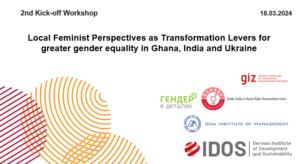How can local feminist perspectives be used as levers for transformative change? This question guides the project ‘Local feminist perspectives as transformation levers for greater gender equality’.

The project explores the potential of local feminist perspectives for transformative change towards greater gender equality and sustainable development in Ghana, India and Ukraine. After its successful first kick-off workshop in January with presentations shared by the Goa Institute of Management, India and the Gender Studies and Human Rights Documentation Centre, Ghana, the project organised the second kick-off workshop in March with a presentation by the Ukrainian partner institute, Gender in Detail.
Like the team of the Goa Institute of Management and the Gender Studies and Human Rights Documentation Centre, the study conducted by Gender in Detail applies a feminist methodology and is committed to a feminist ethic. Applying a sequential mixed-method approach, the Ukrainian team focuses on local feminist perspectives in Ukraine in the context of war and ongoing defence. The workshop sparked some interesting discussions about research methodologies, ethics and definitions of key concepts like transformations and sustainable development among all participants. These exchanges shall be continued and intensified in the next round of interim workshops over the summer between each of the partner institutes and IDOS in Accra, Goa and Berlin as well as in the joint workshop among all partners and IDOS in autumn. In early 2025, all partners will discuss their findings in a multi-stakeholder event in Bonn.
Each study prepared by the three partner institutes will be published as an IDOS discussion paper. The IDOS team will prepare a synthesis study that further analyses the findings of the studies prepared by the three partner institutes and their policy recommendations from a comparative perspective. The findings of the study shall increase local, national and international policy makers’ knowledge and understanding of local feminist concepts and the context-specific approaches to address prevailing norms and practices in transformative development processes.

Schreibe einen Kommentar